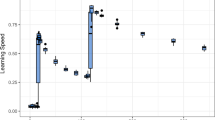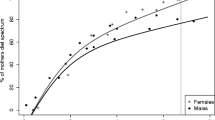Abstract
Recent theoretical models suggest that the difference between human and nonhuman primate life-history patterns may be due to a reliance on complex foraging strategies requiring extensive learning. These models predict that children should reach adult levels of efficiency faster when foraging is cognitively simple. We test this prediction with data on Meriam fishing, spearfishing, and shellfishing efficiency. For fishing and spearfishing, which are cognitively difficult, we can find no significant amount of variability in return rates because of experiential factors correlated with age. However, for shellfish collecting, which is relatively easy to learn, there are strong age-related effects on efficiency. Children reach adult efficiency more quickly in fishing as compared to shellfish collecting, probably owing to the size and strength constraints of the latter.
Similar content being viewed by others
References
Beckett, J. R. 1987 The Torres Strait Islanders: Custom and Colonialism. Cambridge: Cambridge University Press.
Bird, D. W. 1997 Behavioral Ecology and the Archaeological Consequences of Central Place Foraging among the Meriam. In Rediscovering Darwin: Evolutionary Theory and Archaeological Explanation, C. M. Barton and G. A. Clark, eds. Pp. 291–308. Archaeological Papers of the American Anthropological Association No. 7.
Bird, D. W., and R. Bliege Bird 1997 Contemporary Shellfish Gathering Strategies among the Meriam of the Torres Strait Islands, Australia: Testing Predictions of a Central Place Foraging Model. Journal of Archaeological Science 24:39–63.
2000 The Ethnoarchaeology of Juvenile Foragers: Shellfishing Strategies among Meriam Children. Journal of Anthropological Archaeology 19:461–467.
2002 Children on the Reef: Slow Learning or Strategic Foraging? Human Nature 13:269–297.
Bird, D. W., J. Richardson, P. Veth, and A. Barham 2002 Explaining Shellfish Variability in Middens on the Meriam Islands, Torres Strait, Australia. Journal of Archaeological Science 29, in press.
Bjorklund, D. F. 1997 The Role of Immaturity in Human Development. Psychological Bulletin 122:153–169.
Bliege Bird, R. 1999 Cooperation and Conflict: The Behavioral Ecology of the Sexual Division of Labor. Evolutionary Anthropology 8:65–75.
Bliege Bird, R., and D. W. Bird 1997 Delayed Reciprocity and Tolerated Theft: The Behavioral Ecology of Food Sharing Strategies. Current Anthropology 38:49–78.
Bliege Bird, R., D. W. Bird, and J. M. Beaton 1995 Children and Traditional Subsistence on Mer (Murray Island), Torres Strait, Australia. Australian Aboriginal Studies 1995:2–17.
Bliege Bird, R., E. A. Smith, and D. W. Bird 2001 The Hunting Handicap: Costly Signaling in Human Foraging Strategies. Behavioral Ecology and Sociobiology 50:9–19.
Blurton Jones, N. G., and F. Marlowe 2002 Selection for Delayed Maturity: Does It Take 20 Years to Learn to Hunt and Gather? Human Nature 13:199–238.
Blurton Jones, N. G., K. Hawkes, and J. O’Connell 1989 Modeling and Measuring the Cost of Children in Two Foraging Societies. In Comparative Socioecology: The Behavioral Socioecology of Humans and Other Mammals, V. Standen and R. A. Foley, eds. Pp. 367–390. Boston: Blackwell Scientific.
Bogin, B. 1988 Human Growth and Development from an Evolutionary Perspective. In Long-Term Consequences of Early Environments: Growth, Development and the Lifespan Developmental Perspective, D. J. K. Henry and S. J. Ulijaszek, eds. Pp. 7–24. Cambridge: Cambridge University Press.
Charnov, E. L. 1989 Natural Selection on the Age of Maturity in Shrimp. Evolutionary Ecology 3:236–239.
1993 Life History Invariants: Some Explanations of Symmetry in Evolutionary Ecology. Oxford: Oxford University Press.
Charnov, E. L., and D. Berrigan 1993 Why Do Female Primates Have Such Long Lifespans and So Few Babies? Evolutionary Anthropology 1:191–194.
Haddon, A. C. 1908 Sociology, Magic and Religion of the Eastern Islanders. Reports of the Cambridge Anthropological Expedition to Torres Straits, Vol. VI. Cambridge: Cambridge University Press.
1935 General Ethnography. Reports of the Cambridge Anthropological Expedition to Torres Straits, Vol. I. Cambridge: Cambridge University Press.
Hawkes, K., J. O’Connell, and N. Blurton Jones 1995 Hadza Children’s Foraging: Juvenile Dependency, Social Arrangements and Mobility among Hunter-gatherers. Current Anthropology 36:688–700.
Hill, K. 1993 Life History Theory and Evolutionary Anthropology. Evolutionary Anthropology 2:78–88.
Hill, K., and H. Kaplan 1999 Life History Traits in Humans: Theory and Empirical Studies. Annual Review of Anthropology 28:397–430.
Hurtado, A. M., K. Hill, H. Kaplan, and I. Hurtado 1992 Trade-offs between Female Food Acquisition and Child Care among Hiwi and Ache Foragers. Human Nature 3:185–216.
Isaac, G. L. 1978 Food Sharing in Human Evolution: Archaeological Evidence from the Plio-Pleistocene of East Africa. Journal of Anthropological Research 34:311–325.
Johannes, R. E., and J. W. MacFarlane 1984 Traditional Sea Rights in the Torres Strait Islands, with Emphasis on Murray Island. Senri Ethnological Studies 17. Japan.
1991 Traditional Fishing in the Torres Strait Islands. Hobart, Tasmania: CSIRO (Commonwealth Scientific and Industrial Research Organization), Division of Fisheries.
Kaplan, H., K. Hill, J. Lancaster, and A. Magdalena Hurtado 2000 A Theory of Human Life History Evolution: Brains, Learning and Longevity. Evolutionary Anthropology 9:156–185.
Kitaoji, H. 1977 The Myth of Bomai: Its Structure and Contemporary Significance for the Murray Islanders, Torres Strait. Min Zoku Gaka Kenku (Journal of Ethnology) 42:209–212. Japan.
Pereira, M., and L. Fairbanks (eds.) 1993 Juvenile Primates: Life History, Development, and Behavior. New York: Oxford University Press.
Quiatt, D., and J. Kelso 1985 Household Economics and Hominid Origins. Current Anthropology 26:207–222.
Roff, D. 1992 The Evolution of Life Histories. London: Chapman and Hall.
Sharp, N. 1993 Stars of Tagai: The Torres Strait Islanders. Canberra: Aboriginal Studies Press.
1996 No Ordinary Judgment: Mabo, the Murray Islanders’ Land Case. Canberra: Aboriginal Studies Press.
Smith, E. A., and R. Bliege Bird 2000 Turtle Hunting and Tombstone Opening: Public Generosity as Costly Signaling. Evolution and Human Behavior 21:245–261.
Stearns, S. 1992 The Evolution of Life Histories. Oxford: Oxford University Press.
Tooby, J., and L. Cosmides 1992 The Psychological Foundations of Culture. In The Adapted Mind: Evolutionary Psychology and the Generation of Culture, J. H. Barkow, L. Cosmides, J. Tooby, eds. Pp. 19–136. New York: Oxford University Press.
Whiten, A., and R. Byrne (eds.) 1997 Machiavellian Intelligence II: Extensions and Evaluations. Cambridge: Cambridge University Press.
Author information
Authors and Affiliations
Corresponding authors
Additional information
Rebecca Bliege Bird is an assistant professor and Douglas Bird is a research assistant professor at the University of Maine. Both received their doctorates in anthropology at the University of California, Davis. Rebecca’s current interests involve the role of intrasexual competition and signaling in the evolution of foraging strategies and the sexual division of labor. Douglas has long had an interest in children’s foraging and has published a series of papers on the archaeological consequences of adult and children’s foraging strategies in coastal environments.
Rights and permissions
About this article
Cite this article
Bird, R.B., Bird, D.W. Constraints of knowing or constraints of growing?. Hum Nat 13, 239–267 (2002). https://doi.org/10.1007/s12110-002-1009-2
Received:
Accepted:
Issue Date:
DOI: https://doi.org/10.1007/s12110-002-1009-2




